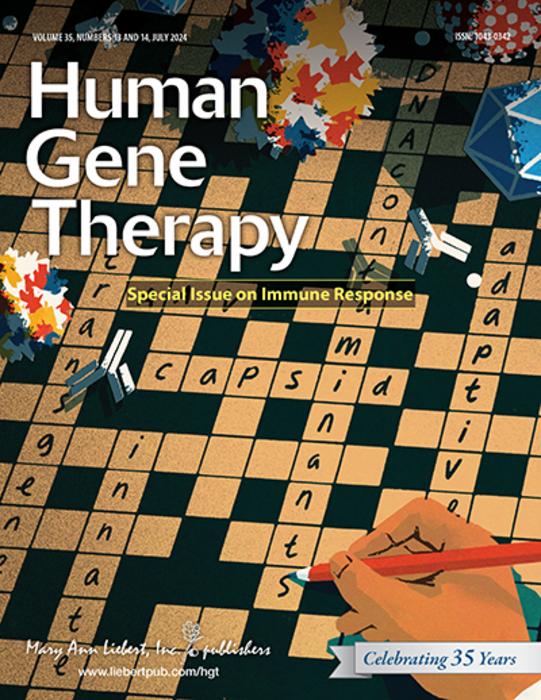A new study shows that subretinal adeno-associated virus 8 (AAV8) injections cause proinflammatory T-cell immune response against the transgene product. According to the study, published in the peer-reviewed journal Human Gene Therapy, co-injection of immunodominant peptides from the transgene product, along with AAV8, modulates the immune response at all AAV doses tested. Click here to read the article now.
Despite the initial promising results of AAV-based therapy for retinal diseases, long-term follow-up of patients in some clinical trials has revealed inflammatory events and reduction of the visual field after the intial AAV-induced improvement for some patients.
Syvain Fisson, Université Paris-Saclay, Généthon, and Sorbonne Université, and coauthors, concluded that “our data suggest that injection of AAV8 in the subretinal space induces proinflammatory peripheral T-cell responses to the transgene product that can be modulated by the subretinal associated immune inhibition (SRAII) mechanism.”
“Currently, clinical AAV gene therapy trials for retinal diseases rely on broad-spectrum effects of corticosteroids to dampen adverse T cell-mediated immune responses,” says Editor in Chief Terence R. Flotte, MD, Celia and Isaac Haidak Professor of Medical Education and Dean, Provost, and Executive Deputy Chancellor, University of Massachusetts Medical School. “The paper by Fisson, et al., demonstrates how a more antigen-specific immune modulatory effect.”
About the Journal
Human Gene Therapy, the Official Journal of the European Society of Gene and Cell Therapy and eight other international gene therapy societies, was the first peer-reviewed journal in the field and provides all-inclusive access to the critical pillars of human gene therapy: research, methods, and clinical applications. The Journal is led by Editor-in-Chief Terence R. Flotte, MD, Celia and Isaac Haidak Professor of Medical Education and Dean, Provost, and Executive Deputy Chancellor, University of Massachusetts Medical School, and an esteemed international editorial board. Human Gene Therapy is available in print and online. Complete tables of contents and a sample issue are available on the Human Gene Therapy website.
About the Publisher
Mary Ann Liebert, Inc. is a global media company dedicated to creating, curating, and delivering impactful peer-reviewed research and authoritative content services to advance the fields of biotechnology and the life sciences, specialized clinical medicine, and public health and policy. For complete information, please visit the Mary Ann Liebert, Inc. website.

Credit: Mary Ann Liebert, Inc.
A new study shows that subretinal adeno-associated virus 8 (AAV8) injections cause proinflammatory T-cell immune response against the transgene product. According to the study, published in the peer-reviewed journal Human Gene Therapy, co-injection of immunodominant peptides from the transgene product, along with AAV8, modulates the immune response at all AAV doses tested. Click here to read the article now.
Despite the initial promising results of AAV-based therapy for retinal diseases, long-term follow-up of patients in some clinical trials has revealed inflammatory events and reduction of the visual field after the intial AAV-induced improvement for some patients.
Syvain Fisson, Université Paris-Saclay, Généthon, and Sorbonne Université, and coauthors, concluded that “our data suggest that injection of AAV8 in the subretinal space induces proinflammatory peripheral T-cell responses to the transgene product that can be modulated by the subretinal associated immune inhibition (SRAII) mechanism.”
“Currently, clinical AAV gene therapy trials for retinal diseases rely on broad-spectrum effects of corticosteroids to dampen adverse T cell-mediated immune responses,” says Editor in Chief Terence R. Flotte, MD, Celia and Isaac Haidak Professor of Medical Education and Dean, Provost, and Executive Deputy Chancellor, University of Massachusetts Medical School. “The paper by Fisson, et al., demonstrates how a more antigen-specific immune modulatory effect.”
About the Journal
Human Gene Therapy, the Official Journal of the European Society of Gene and Cell Therapy and eight other international gene therapy societies, was the first peer-reviewed journal in the field and provides all-inclusive access to the critical pillars of human gene therapy: research, methods, and clinical applications. The Journal is led by Editor-in-Chief Terence R. Flotte, MD, Celia and Isaac Haidak Professor of Medical Education and Dean, Provost, and Executive Deputy Chancellor, University of Massachusetts Medical School, and an esteemed international editorial board. Human Gene Therapy is available in print and online. Complete tables of contents and a sample issue are available on the Human Gene Therapy website.
About the Publisher
Mary Ann Liebert, Inc. is a global media company dedicated to creating, curating, and delivering impactful peer-reviewed research and authoritative content services to advance the fields of biotechnology and the life sciences, specialized clinical medicine, and public health and policy. For complete information, please visit the Mary Ann Liebert, Inc. website.
Journal
Human Gene Therapy
Method of Research
Experimental study
Subject of Research
People
Article Title
Peripheral Cellular Immune Responses Induced by Subretinal Adeno-Associated Virus Gene Transfer Can Be Restrained by the Subretinal-Associated Immune Inhibition Mechanism
Article Publication Date
17-Jul-2024



